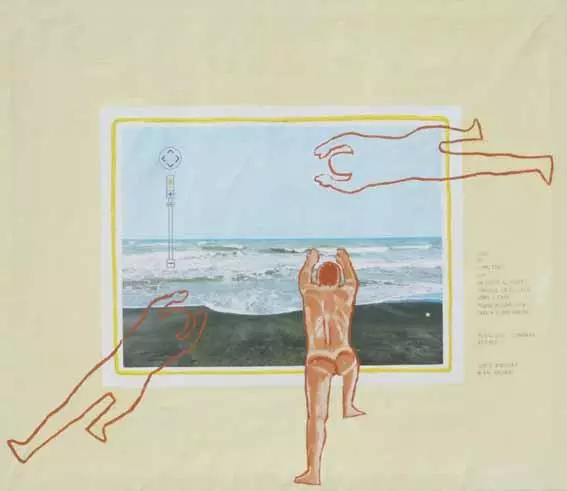The game is on the concepts of space and language that continually intersect to create a unique human and social values on which the artist reflects and brings to reflect.
The poems of Francis Muzzioli and the works of Barbara Think, seem to put together properly completed, encouraging a fervent exchange between the poetic word and the work of art. In this way the figurative is enriched by the poetry, it strengthens, and vice versa.
"Dream aware of is the one that comes Barbara Think: in Mirage, ATM, Saline, landscapes have first the soft contours of a dream, then the architecture and the human presence break the harmony ideal to become representations of an irrational world , messy. At the same time, the man with his load existential becomes the symbol of a new closeness to things. It 's so that the imaginary journey ridden the wave of words, thoughts and poetry, it becomes real journey in search of different horizons. The artist, like the poet, is challenging and defend himself before the excess of reality, find new ideal scenarios from which to start. "
"Endless hours, hours when adding ideal to the real, to draw up the map of an architectural utopia. Streets, landscapes, houses, people, belong to a place yet to be discovered. The technology, this vast sea of links, it becomes like a book from which to draw fluidly "connections" perfect, going beyond the limits on a journey where communication is the basis of a spider's web imaginary and shareable. In the art of Barbara thinks it reads well this path that the outcome of a revival. "
"The distance is to think Barbara is a necessary condition to relate with the world. A need that the incentive to reduce the physical and mental space to translate it into art. The artist began his journey to make sense of a distance that has turned into desire: to physically occupy the space of the imagination. Its tourist, essential, reduced to a profile graph, is the symbol of a new way of looking at reality, breaking down every barrier "digital" and diving, finally over the details of its imaginary space. It 'a journey back what Barbara thinks accomplishes in his conscience, clashing with time and space that before then were endless. Subject to different laws of their size will speed up and expand according to the needs of his creative mind. "
"A as analysis of the concept of intelligence-Connective Collective work of Barbara Tourist Think.
I find myself in front of a painting, a painting of a metrata roughly to the side. A man, apparently with the intention utopian to leapfrog their own reality, you are literally diving into the virtual dimension of a seascape. Surreal idea if the work had been carried out a century ago, perfect to speak instead of our time. Because our women, men, children born and adopted by the twenty-first century.
Suddenly a dejavu. Just the other day, in search of a common recreational area for the weekend, I was connected to the network ready to click my Google map, holy grail of tourists. A simple gesture that awakens emotion joint leavening between the past, tied to a personal experience of a few days ago, and the present, triggered by the vision of this work that brings with it the baggage of feelings that only knows a trip create.
Think beard raises a very subtle reflection in the minds savvy.
We who live in the era of revolution 2.0, the era in which new media have become intermediate environments with access to the intimate reality of our psyche private, the artist asks what are the benefits and the implications of such an extension of perspective on our lives.
That tourist, protagonist of the work by the author is reduced to a mere piece of the image, a figure that dissolution becomes simple outline within a two-dimensional space, the virtual environment.
A curious investigation of the concept of space that now more than ever, has become accustomed to new types of relationships, choral, fast and virtual triggered via the web.
The example provided by the network (and already the definition itself bears a reflection) helps us to understand the new type of (trans) mental training in place, a learning generated by social interaction able to match forms of natural knowledge in ways mediated and virtualized. Learning as a social process: the interaction of groups capable of generating knowledge.
At the core of this discussion is the idea of collective intelligence, theorized by Pierre Levy, group interaction designed to share memory, imagination, experience and culture. A synergy of forces.
Modern technologies accentuate user interactivity and appearance of telematics connectivity, creating new codes, new modes of expression in alternative contexts. Computer screens become places in which thought is shared from anywhere in the world. This is Connective Intelligence, as claimed by Derrick De Kerckhove. The private identity is reconstructed symbolically through sharing.
Major changes are in place consequently also in the notion of art.
The works take on a sort of ubiquity, becoming sources whose effects are noticeable everywhere. In the words of Paul Valery to explain the concept, the result of this new form of art is a stream of visual images or auditory sensations with a simple gesture, a society characterized by the possibility of a "distribution of the sensible reality in the Home" ( ...) the possibility to drop the use of the work of art dall'hic et nunc of its physical location or its execution, to make it accessible in the spiritual moment more favorable and fruitful.
 Share / Save
Share / Save






Comments 0
Say something